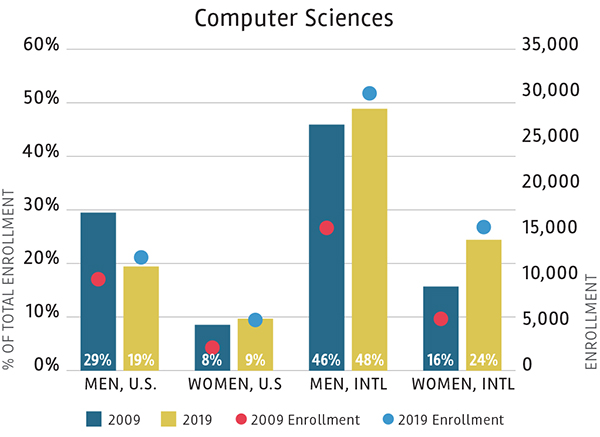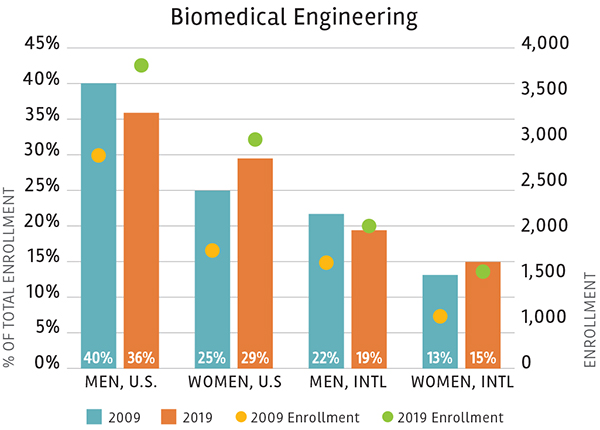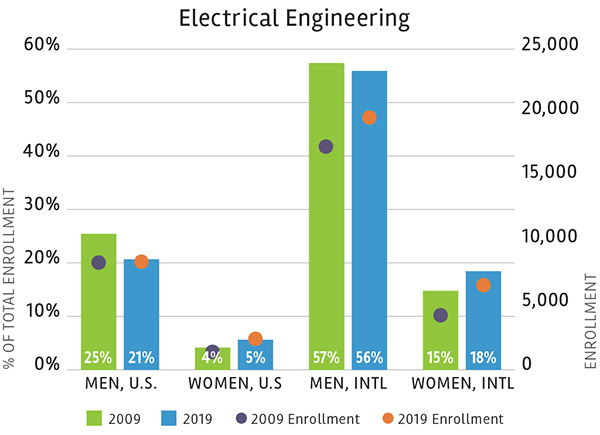Decline in international graduate students may undermine efforts to increase gender diversity in science and engineering.
By Roberta Rincon, Ph.D., SWE Associate Director of Research
The National Foundation for American Policy (NFAP), a 501(c)(3) nonprofit, nonpartisan public policy research organization, recently released a policy brief on international students in science and engineering. The key findings note the decline in international graduate students (students pursuing master’s and doctoral degrees), which began a few years before the immigration restrictions imposed during the COVID-19 pandemic.[1] This trend is concerning because graduate engineering and science programs in the United States rely heavily on international student enrollments. In many of these programs, most of the full-time graduate students are international students. The U.S. needs foreign-born scientists and engineers to meet the demand for science, engineering, and technical talent that we are unable to fulfill otherwise.
Expanding on the findings of the NFAP, we find that while men’s graduate enrollment increases have largely been among international students, the increases that we have seen in women’s enrollments in engineering and computer sciences programs have included both U.S. and international students (Figure 1).
Figure 1: Full-time Graduate Engineering and Computer Sciences Enrollment, by Citizenship and Gender

Over the last decade, women’s enrollment in full-time graduate programs in engineering and computer sciences has significantly increased, and while much of this growth has been among international students, we have also seen more U.S. women pursuing graduate degrees in these fields. In computer sciences, U.S. women’s graduate enrollment doubled from 2009 to 2019, while international women’s graduate enrollment almost tripled. As a result, there were over 12,000 more women enrolled in computer sciences graduate programs as full-time students in 2019 than there were in 2009 (Figure 2). Biomedical engineering, electrical engineering, and mechanical engineering also saw over 1.5 times more women pursuing graduate degrees in 2019 than in 2009 (Figure 2).
Figure 2: Full-time Graduate Student Enrollment, by Program, Citizenship, and Gender, 2009 vs. 2019
Sources: NCSES Interactive Data Tool
While we don’t yet know the full impact of COVID-19 on graduate enrollments, the declining enrollments of international students since 2016 are likely to have been exacerbated by certain federal policies, including the current blocking of visas for Chinese graduate students and scholars. Such policies block thousands of students each year. NFAP estimates that for every 1,000 Ph.D. students blocked in a year from attending U.S. universities, we lose $210 billion in the expected value of patents over 10 years and nearly $1 billion in lost tuition over this same period.[2] This is just within the higher education sector. The loss outside of university settings is unknown.
In addition to the monetary impact the enrollment declines present, they undermine our efforts to increase gender diversity in the sciences and engineering. The data show that women, particularly international women, have increasingly chosen U.S. graduate engineering and computer sciences programs. If their pursuit of additional education in the U.S. is able to continue, we will see a healthy increase in the diversity of the engineering and technology professions, including the STEM faculty who will train our future STEM talent, and help the U.S. maintain its position as an innovative global leader in science and engineering.
- National Foundation for American Policy (August 2021). International Students in Science and Engineering.
- Ibid





